|

A Concentrated Distillation
Peter Brook's 'La Tragedie de Carmen',
reviewed by ROBERT HUGILL
English Touring Opera usually performs larger scale operas in reduced orchestrations but for its new production of Carmen (seen Saturday 11 October 2008 at the Hackney Empire, London) the company has chosen to perform Peter Brook's radical re-working, La Tragedie de Carmen. Originally produced at Brook's Les Bouffes du Nord Theatre in 1981, the piece dispenses with the chorus and many of the lighter opera comique elements. Instead Brook returns to Prosper Mérimée's novel and offers a concentrated distillation of Carmen in just ninety minutes (without interval).
There are just four singers: Carmen (Leah-Marian Jones), Don Jose (David Curry), Micaela (Sinead Campbell-Wallace) and Escamillo (Nicholas Garrett). In this production Keel Watson in the speaking role of Lilas Pastia became something of a master of ceremonies, involved in setting the scene from the beginning. The other speaking roles of Zuniga and Carmen's husband Garcia were both played by Maciek O'Shea. Garcia is a character out of the original novel that Brook has returned to the action.
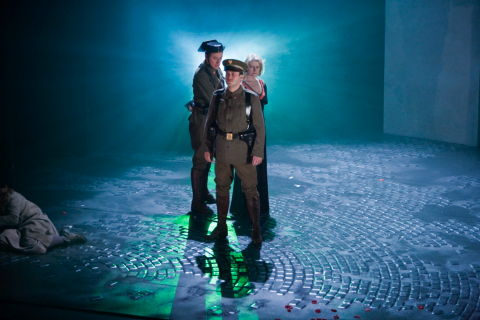
David Curry (Don Jose), Maciek O'Shea (Zuniga) and Leah Marian Jones (Carmen). Photo © 2008 Robert Workman
|
Andrew Steggall's production, with economic but stylish sets by Sarah Bacon, originated in Wexford in 2007. Bacon's costumes set the action firmly in the late 1930s. Steggall's imaginative, compressed staging made it ideal for English Touring Opera's small to medium scale venues. Steggall made much use of shadow play. The plot was acted out in shadow during the prelude: Carmen and Don Jose's coupling was seen in a similar manner as was Don Jose and Garcia's fight.
The plot has been somewhat re-adjusted from Bizet; there are no smugglers, Don Jose fights and kills both Zuniga and Garcia. In a significant dislocation Brook has moved the flower song to the end of this scene, so that it becomes a prelude to Carmen and Don Jose's love making, rather than Carmen denying that Don Jose loves her.
Don Jose's descent into moral turpitude is here solely the fault of his obsession. Brook's La Tragedie de Carmen is completely character based; there are no external forces at work in Don Jose's fate.
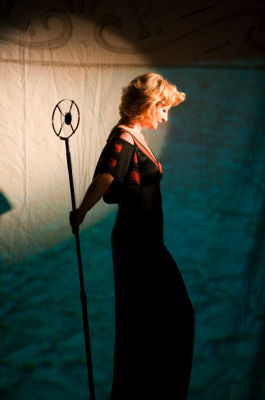
Leah Marian Jones as Carmen. Photo © 2008 Robert Workman
|
Here Carmen is less of a gypsy and more an entertainer, whore and part-time thief working for Lilas Pastia. Leah-Marian Jones' Carmen was a highly elegant, fatalistic yet dangerous figure. Her account of the character was very much in the tradition of Victoria de Los Angeles and Teresa Berganza, elegantly sung, passionate, but less earthy and more stylish and chic.
Jones has sung Carmen in the full Bizet version and this told in the way she seemed at home in Bizet's melodies, shaping them beautifully. The small accompanying ensemble meant that she never had to force her voice; she retained an elegance of line throughout.
David Curry, her Don Jose, had sung the role in this production when it was new in Wexford. Curry has an attractive, light tenor voice. His performance raised questions of how much the lightening of the orchestration affects the type of voice able to sing the role. Curry's light tenor seemed uncomfortable in parts of the role; whilst he had all the notes, it did not feel as if the part sat well in his voice, though he did turn in a fine musical performance.
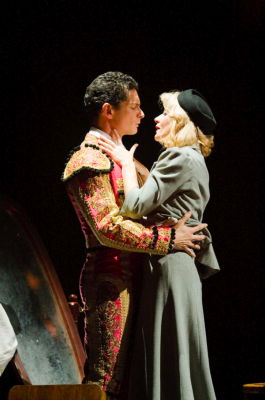
Nicholas Garrett (Escamillo) and Leah Marian Jones (Carmen). Photo © 2008 Robert Workman
|
Curry has a rather English sounding voice. There is nothing specifically wrong with this: after all, Jon Vickers hardly sounded either French or Italian but he was a truly great Don Jose. Unfortunately, for much of the performance, Curry sounded a little too reserved, less than truly passionate, even though his musicality was impeccable. Only in the closing moments did he show the sort of fearsome intensity I would have wished for earlier in the performance.
Both Curry and Jones were required to strip down to their underwear and Nicholas Garrett's Escamillo also had his own shirtless moment in the final act.
Garrett's wasn't the usual swaggering Escamillo: after all in this version he is simply a bloke who come into the bar who happens to be a toreador, rather than one accompanied by a chorus of adoring fans. Garret sang the role finely, with excellent French diction and clarity of words. There were moments when I wondered if the role sat a little high for him; if it did he disguised it well.
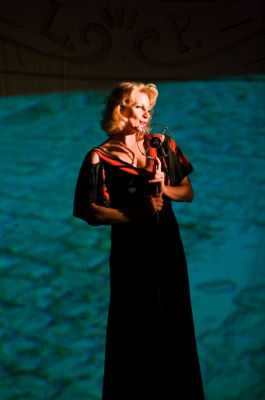
Leah Marian Jones as Carmen. Photo © 2008 Robert Workman
|
Sinead Campbell-Wallace's Micaela got both her arias, but seemed rather diminished. She wasn't so much a character as a concept, someone for Don Jose to break away from and someone to witness his descent into violence. In Act 3 she is shocked at Don Jose's actions, but we lacked the sense of her heroism in coming to the smugglers camp which Bizet brings out.
The standard of sung French was a little variable. Garrett and Jones were both very correct, whilst Curry sounded fluent but less convincing. And Maciek O'Shea, in his spoken roles, sounded extremely mannered.
The last act was inevitably a bit lower key than the original, with a lone Escamillo dressing himself for the Corrida accompanied by a gramophone record of Bizet's music: a neat trick. The climax, when it came, was shattering and made forgivable by the slightly undercooked nature of some of the previous action.
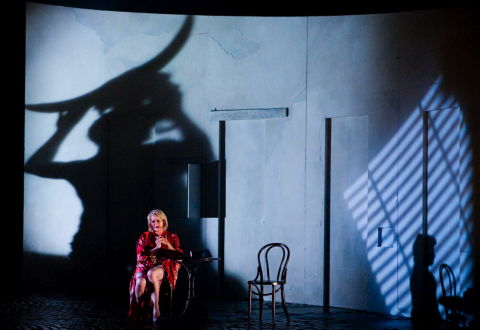
Leah Marian Jones as Carmen. Photo © 2008 Robert Workman
|
The small ensemble was deftly directed by Gareth Hancock who managed to make the reduced orchestration sound natural and right. Much of Bizet's unused music was recycled to underscore silent action, though this placed a far greater strain on the singers as they had to emote silently. Steggall was imaginative in his production and I have no doubts that during the run it will develop and tauten in intensity.
But I have one nagging reservation. Though ETO's publicity emphasises that this is Brook's La Tragedie de Carmen, I wonder how many of their patrons will come out of the theatre feeling cheated, having come for the larger, colourful canvas of Bizet's original opera?
Copyright © 15 October 2008
Robert Hugill, London UK

| 
